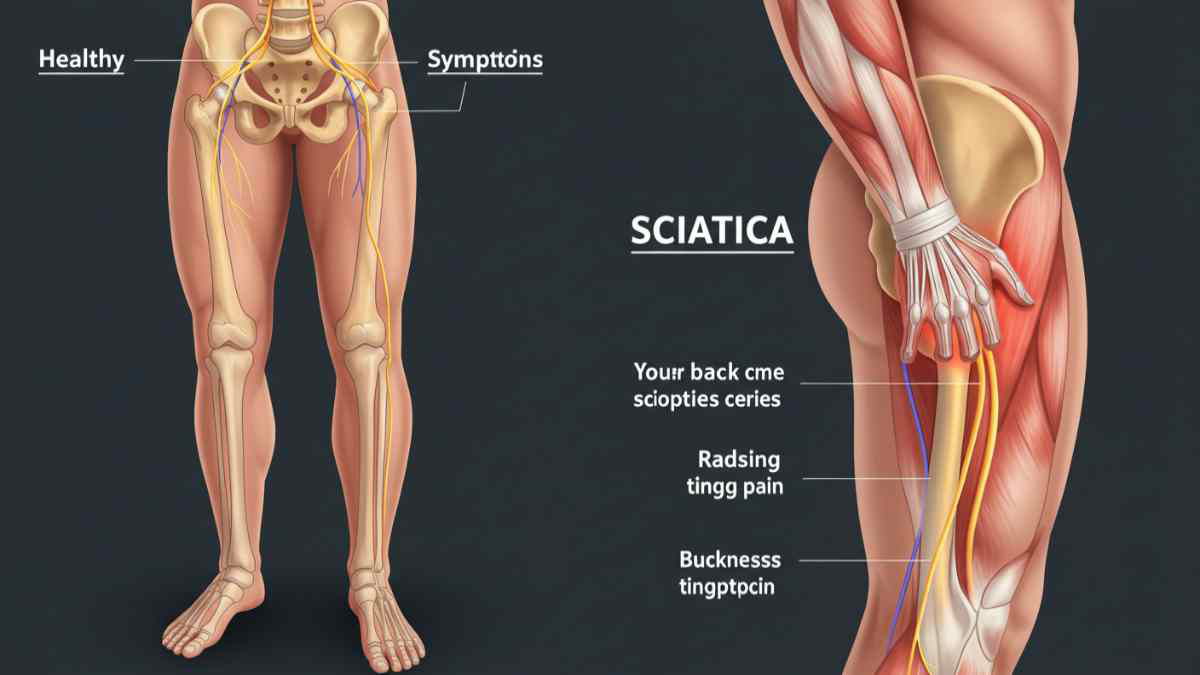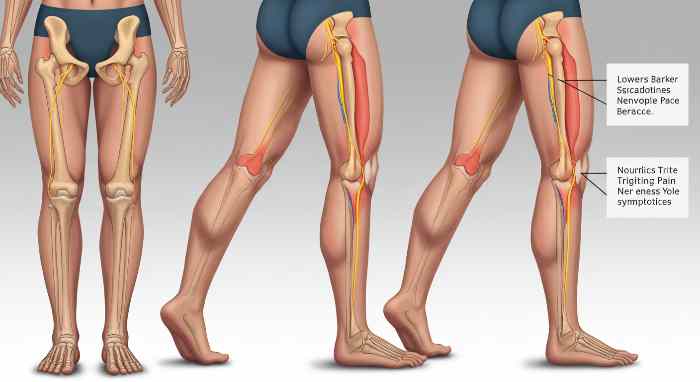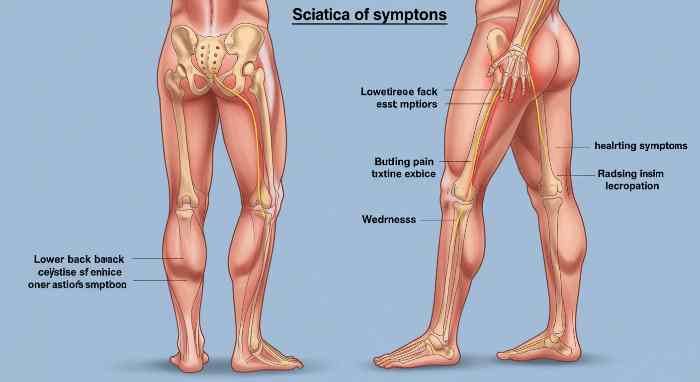Sciatica is a common condition that affects millions of people worldwide. It occurs when the sciatic nerve—the longest nerve in the body—is irritated, compressed, or inflamed , leading to pain that radiates from the lower back down through the hips and legs.
While sciatica isn’t life-threatening, it can be debilitating if left untreated . Recognizing the symptoms of sciatica early is key to managing pain and preventing long-term complications.
What Is Sciatica?
Sciatica refers to pain caused by irritation of the sciatic nerve , which runs from your lower back through your hips and buttocks and down each leg. This nerve controls many of the muscles in your lower legs and provides sensation to your skin there.
When compressed—often by a herniated disc, bone spur, or spinal stenosis—it can cause sharp pain, numbness, or weakness in the leg and foot.

7 Common Symptoms of Sciatica
The hallmark of sciatica is radiating pain , but it can come with several other sensory and motor issues. Here’s what to watch for:
1. Radiating Pain Down the Leg (The Hallmark Symptom)
What It Feels Like:
-
A
sharp, burning, or electric shock-like painthat starts in the lower back or buttock and travels down the back of the thigh, calf, or even the foot.
-
Typically affects
one sideof the body.
Why It Happens:
-
Compression or inflammation of the
sciatic nerve(often due to aherniated discorbone spur).
When to Worry:
-
If the pain
shoots below the knee(indicates true sciatic nerve involvement).
-
If it worsens with
sitting, coughing, or sneezing.
2. Numbness or Tingling (“Pins and Needles”)
What It Feels Like:
-
A
prickling, tingling, or “dead” sensationin the leg, foot, or toes.
Why It Happens:
-
Nerve compression disrupts normal signaling, leading to abnormal sensations.
When to Worry:
-
If numbness
spreads or becomes constant, as this may indicate worsening nerve damage.
3. Muscle Weakness in the Leg or Foot
What It Feels Like:
-
Difficulty
lifting the foot (foot drop)or weakness when trying to stand on tiptoes.
-
A feeling of
heavinessin the affected leg.
Why It Happens:
-
Prolonged nerve compression weakens muscle control.
When to Worry:
-
If you
trip frequentlydue to foot drop.
-
If leg muscles feel
noticeably thinner(sign of muscle atrophy).

4. Lower Back Pain (But Not Always Present)
What It Feels Like:
-
A dull ache or stiffness in the lower back, sometimes preceding leg pain.
Why It Happens:
-
The root cause (e.g., herniated disc) often originates in the spine.
When to Worry:
-
If back pain is
severe and sudden(could indicatecauda equina syndrome, a medical emergency).
5. Pain That Worsens with Movement
What It Feels Like:
-
Pain intensifies when
sitting, bending forward, or twisting.
-
Relief may come from
walking or lying down.
Why It Happens:
-
Certain positions
increase pressure on the sciatic nerve.
When to Worry:
-
If pain makes it
hard to walk or stand for more than a few minutes.
6. Shooting Pain When Sneezing or Coughing
What It Feels Like:
-
A sudden
jolt of paindown the leg when coughing, sneezing, or straining.
Why It Happens:
-
Increased abdominal pressure
aggravates the compressed nerve.
When to Worry:
-
If this symptom appears
alongside bladder/bowel dysfunction(emergency sign).
7. Constant Pain in One Buttock (Piriformis Syndrome)
What It Feels Like:
-
Deep, aching pain in
one buttock, sometimes mistaken for a muscle strain.
Why It Happens:
-
The
piriformis muscle(near the sciatic nerve) spasms and irritates the nerve.
When to Worry:
-
If pain
doesn’t improve with stretching or massage.

How to Relieve Sciatica Pain (At-Home Remedies)
1. Heat & Ice Therapy
- Ice packs(20 mins) reduce inflammation.
- Heating padsrelax tight muscles.
2. Gentle Stretching & Yoga
- Piriformis stretchandcat-cow posecan help.
3. Over-the-Counter Pain Relievers
- NSAIDs (ibuprofen)reduce swelling.
4. Avoid Prolonged Sitting
-
Take breaks to
walk or standevery 30 minutes.
Long-Term Prevention Tips
✅ Strengthen core muscles (planks, bridges).
✅ Maintain good posture (avoid slouching).
✅ Lift heavy objects properly (bend knees, not back).
✅ Stay active (walking, swimming).
So if you’re experiencing shooting leg pain or numbness , don’t wait. Your sciatic nerve is trying to tell you something—listen and take care.